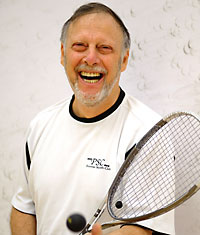Basil's Story
Squashing back pain: Advanced surgery repairs Basil Herzstein’s spine
 The straw that broke the camel's back - and severely injured Basil Herzstein's spine - occurred on a plane ride home from his vacation in August. The 59-year-old generously offered to help a fellow passenger lift her bag into the overhead compartment - and knew immediately he had seriously hurt his back.
The straw that broke the camel's back - and severely injured Basil Herzstein's spine - occurred on a plane ride home from his vacation in August. The 59-year-old generously offered to help a fellow passenger lift her bag into the overhead compartment - and knew immediately he had seriously hurt his back.
It didn't take long until he was doubled over in agony. "The pain was debilitating. I was basically bedridden, and I couldn't work," says Basil, a certified financial planner from Rockville. "In fact, just walking was a nightmare."
This was very frustrating for Basil, who had suffered other sports injuries in the past. "I had been enjoying playing squash five times a week," he explains. "I've played since I was 18 years old, and I love it."
Anxious to get back to work - and hopefully squash - Basil turned to Philip Schneider, MD, orthopedic spine surgeon, medical director, Holy Cross Hospital Spine Center, who diagnosed him with a massive disk herniation.
Basil's reaction? "I did my homework and knew I could trust my care to Dr. Schneider and Holy Cross Hospital," he says.
Dr. Schneider performed a minimally invasive microdiskectomy - an advanced surgical technique used to treat herniated disks. "The procedure has proved to be 90 to 95 percent successful in relieving pain for individuals suffering from herniated disks," Dr. Schneider explains. "Many patients who undergo the procedure report at least some degree of relief from back and/or leg pain immediately after having the procedure."
A microdiskectomy is performed through a very small incision - usually only one to 1½ inches -in the lower back. During the procedure, a small portion of the bone over the nerve root and/or disk material from under the nerve root is removed to relieve pressure on the spine and to create more room for the nerve to heal.
Because the procedure leaves intact nearly all of the joints, ligaments and muscles, it does not change the mechanical structure of the patient's spine.
After his outpatient procedure, Basil was able to walk around pain-free. "I was very pleased with my treatment and the staff," he says. "And the preoperative and postoperative care was very good."
Basil is clearly happy to be back to work, but what about playing squash? About two months after his surgery, he was back on the court. "I'm not quite ready for a match, but every day is one day closer," he says.
